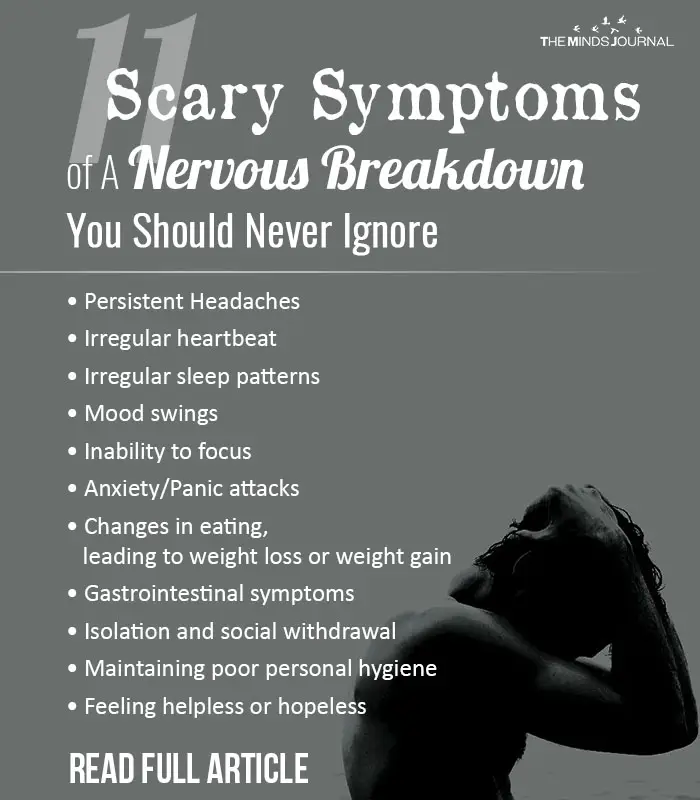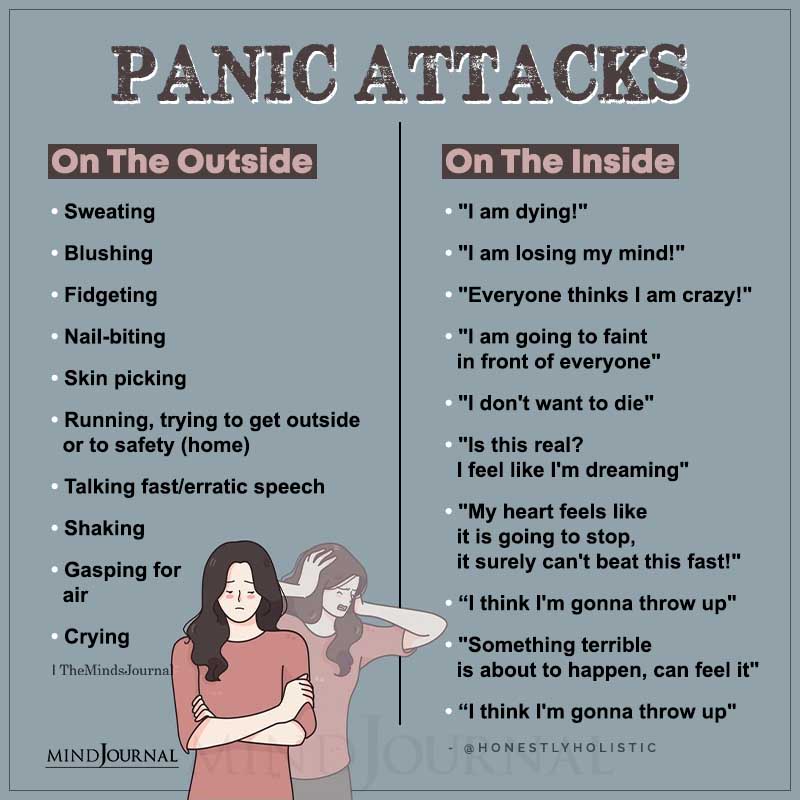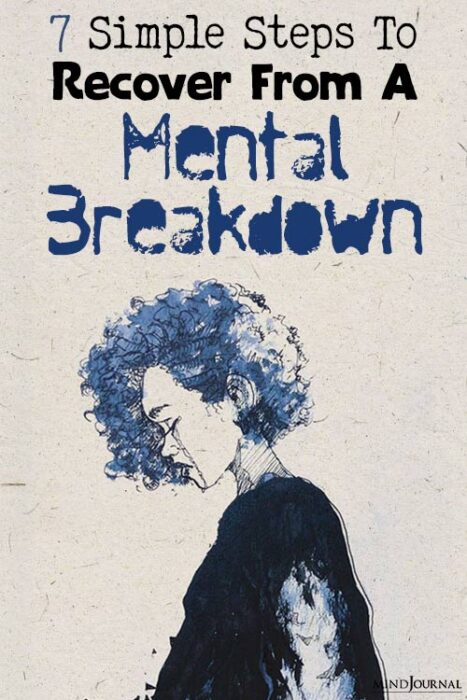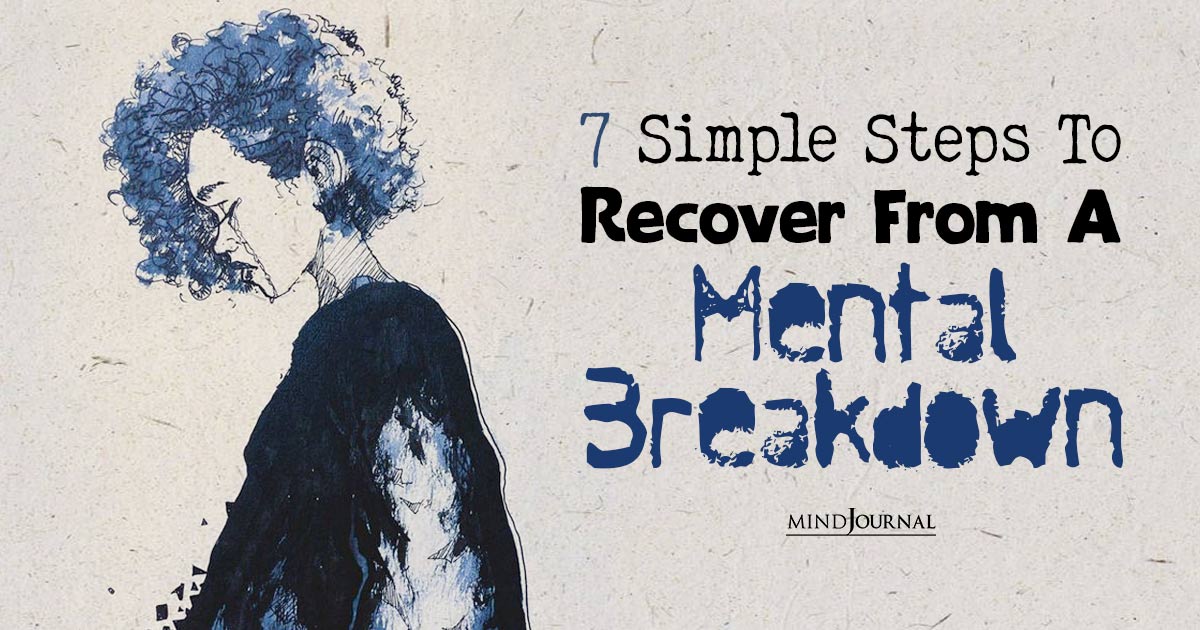Do you often feel shattered and crippled due to overwhelming thoughts and emotions? Then you may be struggling with a mental breakdown, which can be a devastating and terrifying experience. Mental breakdowns and make us feel lost and detached from our own selves. However, there is still hope for recovery. Let’s find out how to recover from a mental breakdown.
What is a Mental Breakdown?
Also known as nervous or emotional breakdown, a mental breakdown refers to an intense mental and emotional period where a person experiences extreme psychological distress due to an inability to deal with overwhelming stresses.
Mental breakdown is defined as “a time-limited condition that presents with primarily anxious and depressed features, associated with a series of external precipitating stressors (e.g., interpersonal, employment, and financial losses),” by researchers.

It is often marked by feelings of emotional and mental exhaustion along with decreased ability to function effectively. You’ll likely feel emotionally exhausted, physically drained or even unable to do basic daily tasks during a mental breakdown.
By understanding what is a mental breakdown, we can better strategize how to recover from a mental breakdown.
Related: Causes Of Mental Health Issues: 6 Common Risk Factors, According To Science
Mental Breakdown Symptoms
Wondering what a mental breakdown looks like? While each person may experience it in their own individual way, here are some of the most common mental breakdown symptoms that you should be aware of –
1. Exhaustion or Loss of Energy
Extreme fatigue from mental breakdowns could leave you feeling completely drained both physically and emotionally. You may also experience a lack of motivation making it hard for you to start or complete even simple tasks.
2. Overwhelming Anxiety and Panic
Intense anxiety accompanied by panic attacks are common symptoms of mental breakdown. You might find yourself having shortness of breath, a rapid heartbeat, tightness in your chest or even a feeling of impending doom.
3. Emotional instability
You may experience sudden mood swings where you go from feeling extremely sad or hopeless to very angry or irritable.
Managing your emotions may seem challenging as you become overwhelmed by minor stressors. This is one of the major mental breakdown symptoms.
4. Cognitive Impairment
Mental breakdowns can also negatively affect your ability to have mental clarity, think logically and concentrate on solutions. It can cause memory problems, making it difficult for you to make decisions. You may also struggle with problem-solving.
5. Social Withdrawal
Overwhelmed by your emotions, you may avoid social situations, isolate yourself and cut off contact with loved ones during your episodes.
Social withdrawal and isolation can make you feel misunderstood, lonely, unsupported and intensify feelings of loneliness and increase the feeling of being disconnected from others.
Related: 11 Scary Symptoms of A Nervous Breakdown

How to Recover from a Mental Breakdown
So what to do when having a mental breakdown? Here are some steps on how to recover from a mental breakdown and reclaim resilience and well-being –
1. Seek Professional Help
It is important that you consult a mental health professional and seek therapy, if needed. A healthcare professional can offer the necessary guidance and support through counseling and other therapeutic interventions that fit your specific situation.
Therapy can help you identify the reasons for your emotional breakdowns and address any underlying mental health issues. They can also help you develop strategies to cope with it and regain control over your thoughts and emotions.
2. Practice Self-Care
Make sure to take care of your body, mind, and soul. Take part in activities that make you happy or relaxed such as spending time in nature or pursuing your hobbies. You should also be mindful and practice meditation to better manage your thoughts and emotions.
Journaling about your thoughts and feelings, spending time with your loved ones and getting a balanced meal and enough sleep can also prove beneficial. Besides, set boundaries and engage in activities promoting recovery.
3. Build a Support Network
Talk openly about your feelings to people you trust and seek emotional support from loved ones who understand what you are going through. Communicating openly to trusted friends or family members about your experience may alleviate some of the isolation and loneliness felt during this period.
Similarly, online discussion groups/forums could help you connect with others who have gone through similar experiences and experience a sense of community. This is how to recover from a mental breakdown.
4. Establish Healthy Habits
Establishing a routine that promotes overall well-being is key. This involves maintaining a balanced diet and avoiding fancy or extreme diets, being physically active on a regular basis and having enough sleep. These can support your brain’s functioning and emotional stability.
5. Challenge Negative Thoughts
Negative thoughts can overwhelm someone when they are experiencing mental breakdown to the extent of distorting one’s perception of reality. Learn to identify negative self-talk and use logical reasoning based on facts to challenge such thoughts.
Replace negative thoughts with positive affirmations, which revolve around self-compassion and self-acceptance.
6. Use Stress Management Techniques
To prevent further emotional breakdowns in future, efficient stress management is essential. Explore different techniques for reducing stress such as deep breathing exercises, progressive muscle relaxation, meditation using mindfulness among others.
Try out various methods that you are comfortable with and incorporate them into your daily routines. This is what to do when having a mental breakdown.
7. Take Small Steps
This journey of recovery requires time and patience. Break your goals into small practical steps that can be achieved within short periods of time.
No matter how small or insignificant the progress may seem; celebrate every milestone achieved as this will keep you motivated and build resilience.
Related: How To Prevent A Mental Breakdown: 8 Useful And Easy Strategies To Cultivate Mental Resilience
Takeaway

To recover from a mental breakdown, focus on self-love, self-compassion, emotional regulation, support and patience. Understanding what is a mental breakdown, mental breakdown symptoms and how to recover from a mental breakdown can help you know what to do when having a mental breakdown.
Remember that you are never alone and seeking professional help is part of the healing process. Start off with self-care and surrounding yourself with people who genuinely love and care for.
Embrace this as an opportunity for self-development and know that recovery is possible. You deserve to live a fulfilling and balanced life.
Frequently Asked Questions (FAQs):
How do you get out of a mental breakdown?
Try these simple yet effective tips- center yourself, be mindful, seek support, and prioritize self-care to overcome a mental breakdown.
How long does it take to recover from a mental breakdown?
Usually, recovery time varies from person to person. Seek professional help and practice self-care if you are struggling with a mental breakdown.
How do you take a mental break?
To take a mental break, pause, breathe deeply, engage in activities you enjoy, and seek tranquility.









Leave a Reply
You must be logged in to post a comment.